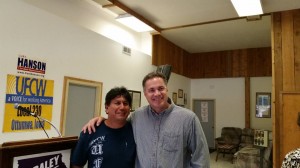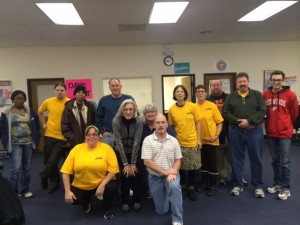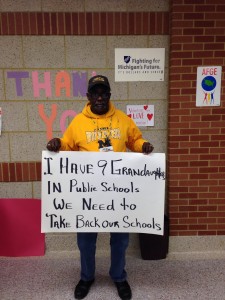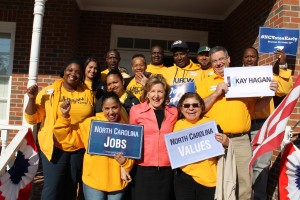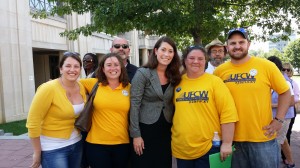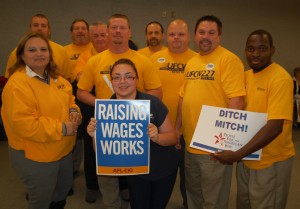November 4, 2014
UFCW Members Across the Country Get the Vote Out
Members from UFCW locals across the country have been busy getting the vote out in key battleground states including Michigan, Kentucky, Iowa, North Carolina, and Pennsylvania–as well as others.
November 3, 2014
UFCW Members Sound Off on Why Voting in This Election Is So Important!
 We asked UFCW members from all around the country why they took a pledge to vote this November 4th in the mid-term elections. Here’s what some of you said:
We asked UFCW members from all around the country why they took a pledge to vote this November 4th in the mid-term elections. Here’s what some of you said:
“To elect candidates who want to protect the middle class, not destroy it.” –-Andrew Myers; Swanton, Ohio
“Too many people died to give me this right and it dishonors their legacy for me not to vote.” –Ericka Ferrell; Oxon Hill, Maryland
“Because we need to oust these career corrupt politicians who don’t listen to what we want or need!” –Anthony Giordano; Hamden, Connecticut
“I am voting to protect women’s rights, to protect unions, elderly, students, the environment, voters, the economy and all of the 99%.” –Member from Chillicothe, Ohio
“To stop anti-union candidates!” –Andrew Carillo; Denver, Colorado
“I’m voting this year because I want a governor that is not going to decimate the private sector unions by introducing right to work.” –Donovan Jurss, UFCW Local 1473
“To exercise my right to have my opinion heard and get rid of Mitch” –Jeanelle Fuson; Covington, Kentucky
“I vote every year!!! We need keep Democrats in office!!!!” –Karen; Dalton, Georgia
“Because it’s the right thing to do.” –Leinaala Furtado; Santee, California
“Because it is time to get all the officials elected that care about working people.” –Mary Spicher
“For a better future for my children” –Nikki Rich; House Springs, Montana
“To try to move this country forward–we have been at this road block way too long” –Pam; Spring, Texas
“To make America a better place, and to help the American worker any way I can…go union–keep fighting for America…” –Prisco; Guilford, Connecticut
“To keep the super-rich from completely taking over this country.” –Tom; Feasterville, Pennsylvania
“It takes the entire community to make a change. As a society, if we don’t start picking our leaders more carefully, we will never progress past the sorry state we are in.” –Member from Indianapolis, Indiana
“I’m voting to insure a Democratic victory for this country and the people who are pushed aside and ignored. It’s time to push back.”
“Yes I am [voting]–also doing door knocking and phone-banking.”
“I’m voting because my vote might help to make a difference in the middle class and the lower class in reference to jobs, economy and education.”
We couldn’t be more proud of all of our engaged members who will be voting to make a difference in their communities, and standing up for working people! Make sure you cast your vote on November 4th if you haven’t already voted early. You can make sure you have everything you need by heading to our voter information hub!
October 31, 2014
UFCW Applauds OSHA’S Effort to Protect Poultry Workers from Musculoskeletal Disorders, Hazardous Workplace Conditions
 WASHINGTON, D.C. — The United Food and Commercial Workers International Union (UFCW) today released the following statement regarding OSHA’s decision to exercise the seldom-used “general duty clause” of the Occupational Safety and Health Act to protect poultry workers from workplace injuries or death.
WASHINGTON, D.C. — The United Food and Commercial Workers International Union (UFCW) today released the following statement regarding OSHA’s decision to exercise the seldom-used “general duty clause” of the Occupational Safety and Health Act to protect poultry workers from workplace injuries or death.
“The UFCW applauds OSHA’s decision to use the “general duty clause” to protect poultry workers from dangerous workplace conditions, including exposure to unsafe machinery, risk of falling and musculoskeletal hazards. The UFCW also commends OSHA’s efforts to look into practices that result in the failure to manage the medical treatment of injured poultry workers and maintain an accurate record of those injuries, resulting in an artificial injury and illness rate that is used to benefit the poultry industry at the expense of the safety of its workers. The UFCW believes that the safety awards presented by the National Chicken Council and other industry groups to member poultry companies for outstanding safety performance should be reconsidered since OSHA’s findings show that the poultry industry has the ability to conceal the extent to which poultry workers suffer from work-related injuries and illnesses.
“The UFCW represents workers at poultry plants across the country, and our union has called attention to the many dangers poultry workers face every day, including ergonomic health hazards. While the UFCW has been successful in curbing some of the workplace abuses in this industry, too many poultry workers do not have a collective voice on the job and continue to toil in low-wage jobs that threaten their health and safety.
“All poultry workers deserve better workplace conditions, and the UFCW urges OSHA to establish a National Emphasis Program to protect poultry workers from the health and safety hazards that are specific to this industry.”
###
The United Food and Commercial Workers International Union (UFCW) represents more than 1.3 million workers, primarily in the retail and meatpacking, food processing and poultry industries. The UFCW protects the rights of workers and strengthens America’s middle class by fighting for health care reform, living wages, retirement security, safe working conditions and the right to unionize so that working men and women and their families can realize the American Dream. For more information about the UFCW’s effort to protect workers’ rights and strengthen America’s middle class, visit www.ufcw.org, or join our online community at www.facebook.com/UFCWinternational and www.twitter.com/ufcw.
October 29, 2014
UFCW Executive Vice President Pat O’Neill Honored for Efforts to Help Walmart Workers
 Last week, UFCW Executive Vice President Pat O’Neill was honored by the UMass Dartmouth Arnold M. Dubin Labor Education Center during their annual awards banquet.
Last week, UFCW Executive Vice President Pat O’Neill was honored by the UMass Dartmouth Arnold M. Dubin Labor Education Center during their annual awards banquet.
For 35 years, the center has served “as a bridge between working people, their communities, organizations, and UMass Dartmouth.” Their awards and dinner banquet are one of the largest gatherings of labor leaders and activists in the area.
The Southeastern Massachusetts labor movement joined the center in honoring UFCW Executive Vice President and Director of Organizing Pat O’Neill for his work with the UFCW’s Walmart campaigns.
“I am honored to accept it on behalf of the 1.3 million members of the United Food and Commercial Workers International Union,” said Pat as he accepted his award.
He continued:
“Brothers and sisters, we are at crossroads in the labor movement. There is no sugarcoating it.Workers are struggling to make ends meet. More and more families are falling behind. Income inequality is getting worse. Minimum wage workers are living in poverty. Hard working immigrants are still living in the shadows.
But in too many corners of our movement, labor is trying to address 21st century challenges with 20th century solutions. It is not working. Some will tell you we need more time—that things will get back to normal eventually.
I say if you’re heading toward a cliff at 100 miles an hour, you don’t need more time. You need a change in direction. That is why I am so proud of our dynamic and forward-looking Walmart campaign.
There are those who say Walmart is too big, too entrenched, and too powerful. That we don’t stand a chance against the world’s largest retailer.
Every important battle for justice has had its share of naysayers. It is always easier to analyze than to mobilize.
Here is what I believe—when we stand together and work together and fight together and dream together—there is nothing we cannot achieve. Last week, Walmart workers and their allies sent shockwaves across the country. They shut down Park Avenue in front of Alice Walton’s $25 million penthouse. They set up a blockade of K Street in front of the Walton Family Foundation in Washington, DC. And they delivered thousands of petitions to the Phoenix home of Walmart Chair Rob Walton calling on the company to give workers $15 dollars and full-time hours. The media coverage surrounding these events was substantial and a clear message was sent to the Walton family and Walmart executives: workers will not be pushed around.”
UFCW Locals 1455 and 328 were in attendance to support Pat as well.
October 25, 2014
Louisville Courier-Journal: ‘Right to work’ harms working families
 In the hit series “The West Wing,” a character mistakenly refers to Kentucky as a right-to-work state. In defense of the show’s writers, you can understand their confusion. Kentucky remains the only state in the South not to pass one of these laws, which shows our political independence and common sense. But Republicans in Frankfort, Sen. Mitch McConnell, and a group of out-of-state, big-moneyed special interests are doing everything in their power to change that.
In the hit series “The West Wing,” a character mistakenly refers to Kentucky as a right-to-work state. In defense of the show’s writers, you can understand their confusion. Kentucky remains the only state in the South not to pass one of these laws, which shows our political independence and common sense. But Republicans in Frankfort, Sen. Mitch McConnell, and a group of out-of-state, big-moneyed special interests are doing everything in their power to change that.
I strongly oppose right-to-work legislation because I love Kentucky and want a bright future for our children and grandchildren. Right to work is a sham. It is, as Martin Luther King Jr. said, “a false slogan” which will “rob us of our civil rights and job rights.”
Slogans are catchy. They are designed to get a quick emotional reaction rather than a detailed understanding. That is why I believe some polls show support for these laws. No one opposes the right of Kentuckians to go to work and earn a living. But slogans are also misleading. They do not tell the full story. A majority of Kentuckians also support collective bargaining and higher wages, both of which are under attack as a result of right to work. As people learn more about who is behind right to work and the harm it causes working families, opposition is going to grow substantially.
So who is behind right to work?
Right to work is being pushed and bankrolled by an organization called the American Legislative Exchange Council (ALEC). Congressman Mark Pocan of Wisconsin, a former member of ALEC who has seen similar battles in his state, called it “nothing more than a corporate-funded and dominated group that operates much like a dating service, only between legislators and special interests.”
Here is how it works. Corporations pay ALEC to wine and dine legislators. In turn, the legislators agree to introduce bills written by ALEC. It’s nothing more than a form of legalized bribery. Who do you honestly think ALEC is looking out for — the people of Kentucky or their corporate contributors? Sen. Mitch McConnell, who has made a career carrying the water of special interests, is also behind right to work. He even went so far as to offer a national right-to-work amendment to civil rights legislation last year.
What does right to work mean for working families? To answer that, there is a brand new study from the University of Illinois and the numbers are disturbing. Right to work reduces wages and salaries by an average of 3.2 percent. It lowers both the share of workers who have health insurance and a pension. It reduces union membership by 9.6 percent. And workers are forced to rely 24 percent more on taxpayer-funded government assistance. In other words, right to work would make Kentucky poorer, sicker, less likely to have retirement security, and more reliant on Uncle Sam. We deserve better.
I am a proud member of United Food and Commercial Workers Local 227. Every few years, my co-workers and I sit down with the company to negotiate the terms of our employment. There are disagreements, but we have always managed to work out a deal without any help from the government. All we want is a fair wage, decent benefits, and respect on the job. Our employer is making profits and I happen to think a happy, healthy, unionized workforce is a big reason why. Right to work assumes that business and labor are unable to bargain a fair contract without the assistance of a bureaucrat. I think in Kentucky, we do just fine on our own.
When it comes to right to work in Kentucky, “The West Wing” got it wrong. Let’s get it right by electing candidates who oppose this misguided legislation.
Shannon McMurray is a member of United Food and Commercial Workers Local 227.
October 22, 2014
The Midwest Pushes Ahead on Immigration Reform
From The Chicago Sun-Times:
Despite inaction on immigration reform in Washington, local municipal and civic leaders are getting things done. Across the country, state houses, city halls and community coalitions are addressing immigration-related policies on their own, creating new ways to strengthen their communities and grow their economies.
Immigrants are a growing demographic in local communities, making immigrant integration a decidedly local concern. The federal gridlock only helps inspire local leaders to tackle what others have postponed addressing.
What’s new and novel today is the shift from enforcement-heavy local policy — such as Arizona’s draconian Senate Bill 1070 in 2010, which criminalized the failure to carry immigraiton documents and gave police authority to detain solely based on suspicion of immigration status — to a series of immigrant-friendly local policies. What’s also striking is the growing number of these local initiatives found in the Midwest, a region with a reputation for being demographically homogenous and generally resistant to change.
Pro-immigration efforts come as no surprise in a place like Chicago, with its rich history of immigration and a mayor who aims to make the Windy City “the most immigrant-friendly city in the nation.” In 2011, he established an Office of New Americans. But city-sponsored programs dedicated to immigrant integration are decidedly more pioneering in places like Indiana, where welcoming initiatives stand in sharp contrast with the state’s 2011 passage of SB590, similar to Arizona’s SB1070.
The Welcoming Center of Indianapolis promotes a successful volunteer network of Natural Helpers, established immigrants who assist new immigrants in transitioning to life in Indianapolis. And Fort Wayne’s Municipal Action for Immigrant Integration offers a “CITYzenship” program that aims to build city officials’ working relationship with immigrant communities.
Such efforts are also trailblazing in Iowa, a state infamous for the 2006 and 2008 federal immigration raids in meatpacking plants in Marshalltown and Postville. But in fact Iowa’s community colleges have expanded their English as a Second Language programs and city leaders have traveled to Mexico to learn about the origins of their largest immigrant community. The Iowa Center for Immigrant Leadership and Integration offers tailored consulting to assist local communities and businesses in better engaging with immigrants and refugees.
Midwestern hospitality is reflected in large state-level immigrant initiatives in Illinois and Michigan and in smaller communities like Dodge City, Kansas — with a population just over 27,000 as of the 2010 Census — as an affiliate of Welcoming America’s Welcoming Cities and Counties initiative. Innovative regional efforts like the Global Great Lakes Network connect like-minded inter-state leaders and organizations in sharing best practices, maximizing impact and resources.
The Midwest’s embrace of its immigrant population is rooted in pragmatism. Savvy civic leaders know that immigration is increasingly a demographic lifeline for the Heartland: Census data show that over the last decade, the metro areas of the 12-state region have shed a collective 1.4 million native-born residents. At the same time, the region’s immigrant population rose 27 percent. Immigration now accounts for 38.4 percent of all metro area growth in the Midwest, with new immigrants sustaining populations, tax bases, and federal political representation, and, perhaps most critically, replacing aging native-born workers in regional labor forces. From Davenport to Duluth, South Bend to Sheboygan, many Midwestern communities are growing almost exclusively because immigrant families are choosing to call them home.
To keep things in perspective, the Midwest is still home to its fair share of restrictive policies. There is more work to be done. But the region’s level of action and commitment to immigrant integration represent a remarkable shift in rhetoric from previous years. Today, the Midwest is home to a significant number of local initiatives, working in concert with efforts in other regions: California’s governor just signed new immigration reform legislation. Atlanta’s mayor recently announced the creation of an office of multicultural affairs. Nashville just launched an Office of New Americans. And many have looked to New York City’s Mayor’s Office of Immigrant Affairs as a blueprint for best practices.
Immigration is, at its core, a local phenomenon, playing out where people actually live and work — and as such, local initiatives will continue to play a critical role in long-term immigration policy, either working in concert with a future federal reform or continuing to fill the void caused by a prolonged congressional stalemate.
Either way, the Midwestern momentum around the issue is unprecedented and notable, offering an example for D.C. policymakers as to what is possible when pragmatism prevails over partisan politics, and policy focuses on facilitating connections between people and the places they live.
Juliana Kerr is director of the Immigration Initiative for the Chicago Council on Global Affairs. Paul McDaniel is the Entrepreneurship & Innovation Fellow for the American Immigration Council.
October 21, 2014
UFCW Local 227 Members Get Out The Vote in Kentucky
 Members of UFCW Local 227 are knocking on doors, making phone calls, and visiting worksites in an effort to get out the vote in Kentucky.
Members of UFCW Local 227 are knocking on doors, making phone calls, and visiting worksites in an effort to get out the vote in Kentucky.
The Bluegrass State is home to one of the most hotly contested Senate races in the country. Republican Senator Mitch McConnell, who introduced national right to work, is facing a fierce challenge from Kentucky Secretary of State Alison Grimes. Local 227 members Chuck Duckworth, Chawan Morgan, and Abigail Shake—all employees of Kroger—have been working hard to get Grimes across the finish line.
“McConnell has sucked the life out of Kentucky,” said Morgan. “We need a fresh face, some new ideas, and a different direction.”
“Alison Grimes understands our struggles,” Shake agreed. “She’s not Washington—she’s Kentucky.”
McConnell’s support for right to work and the close battle for control of Kentucky House of Representatives has brought the issue of workers’ rights front and center.
“We’re the only southern state that’s not right to work,” Duckworth said. “I think this election is very important to keep it that way.”
“I have job security, health insurance, annual raises, equal pay and so many other benefits,” Shake added. “Right to work would take that away.”
The Local 227 members all talked about the importance of reaching out to their coworkers. “For me to go to a door and see a single mom raising three kids on her own, working a job and doing everything she can to get by, for me to help educate her about how to make life a little easier, that’s what is important,” Shake said.
Or as Morgan put it: “It’s about solidarity—being united and strong.”
October 21, 2014
Flexon Workers in New Jersey Vote Union “Yes”, Join RWDSU
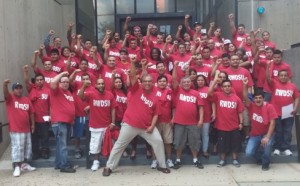 More than 120 workers at Flexon in Newark, New Jersey, overwhelmingly voted to join RWDSU Local 262. The workers – who manufacture lawn and garden hoses sold through retailers including Target, Walmart, Home Depot, and Costco – won the union voice they sought in order to address a number of problems in their workplace.
More than 120 workers at Flexon in Newark, New Jersey, overwhelmingly voted to join RWDSU Local 262. The workers – who manufacture lawn and garden hoses sold through retailers including Target, Walmart, Home Depot, and Costco – won the union voice they sought in order to address a number of problems in their workplace.
“We were fed up and decided that we needed representation, a voice on the job and job security,” said day shift worker Heriberto Moran, who has worked at Flexon for 32 years.
Flexon employees wanted to create better jobs and reached out to RWDSU Local 262. Workers said they were tired of working for minimum wage with no annual wage increases. Workers said they would work 12 hour shifts – sometimes seven days a week – and had no benefits or healthcare plan. The workers’ campaign flourished despite intimidation and harassment by management. Workers weren’t surprised, given the lack of respect from management that they had grown accustomed to.
Workers were bombarded by daily letters, captive audience meetings, faced numerous threats of plant closure, undocumented status threats, threats of deportation and strike threats throughout the campaign by numerous company representatives.
October 17, 2014
Member Spotlight: Jerry Knapp
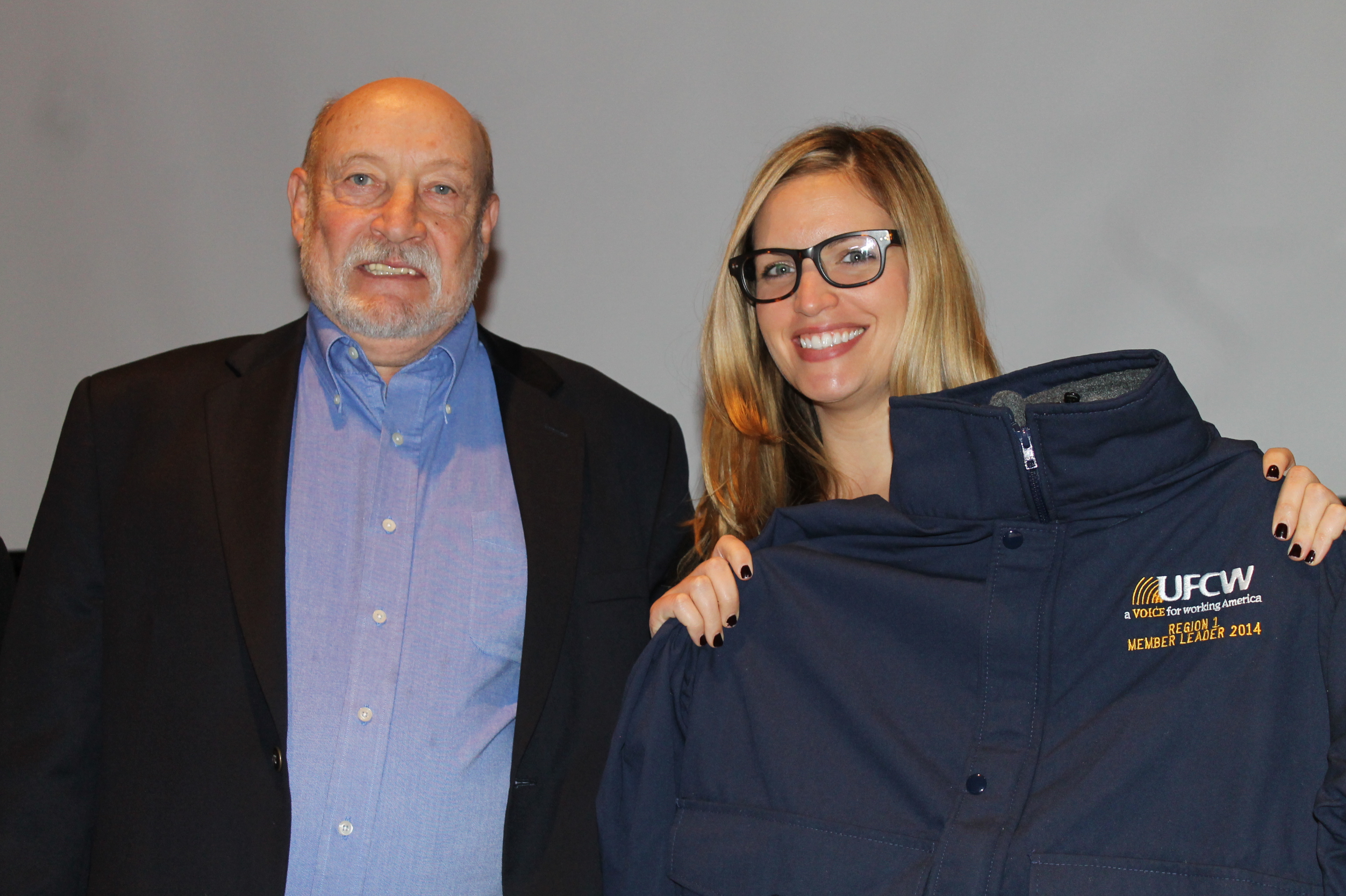 Recently, long-time UFCW Local 1500 member Jerry Knapp was recognized for his years of active service to his union and fellow union members by Region 1, and was awarded with a member award along with several other members who have made a difference in their workplaces. He was taken aback when he learned he was being recognized, Jerry said, but it was nice to know someone knew he existed. After talking with Jerry, it was clear to us why someone would take notice of Jerry and his time in the UFCW:
Recently, long-time UFCW Local 1500 member Jerry Knapp was recognized for his years of active service to his union and fellow union members by Region 1, and was awarded with a member award along with several other members who have made a difference in their workplaces. He was taken aback when he learned he was being recognized, Jerry said, but it was nice to know someone knew he existed. After talking with Jerry, it was clear to us why someone would take notice of Jerry and his time in the UFCW:
Since 1966, Jerry has worked as a union member at Shoprite in Fishkill, New York. Working as a department manager at one time, he is now happily employed as a clerk as he nears retirement. In 1994, Jerry was named the Primary Shop Steward at his store–a role in which he still has today. Jerry says that his job “is a good job because of the union,” and that as UFCW members, he and his coworkers aren’t abused or taken advantage of, and they earn good pay and benefits.
But Jerry knows that these things that make a good union job good are only obtainable when people are active in their unions. Jerry has attended countless area meetings, participated in the negotiating process, and been there to advise fellow members on their rights and responsibilities. Being active and engaged, says Jerry, enables union members to have a say in what happens on the job, to choose your lifestyle, and have your career needs and desires heard, as opposed to working for a non-union company that can make promises and change their minds about policies at the drop of a hat. With a union, he notes, you have the right to go back to the bargaining table.
Not only is Jerry involved in his workplace, but in the wider community and Local as well. Jerry has helped other folks achieve the union difference through his organizing efforts, and he has worked to help elect politicians who will represent and look out for the working people in his area. Jerry’s peers have noted that his work has not only earned him the respect of his coworkers, but of management as well. It’s clear that at the end of this year when Jerry goes into retirement, which will be his 49th year of service in the union, he will be dearly missed at work by all.
His advice for others that want to get more involved in the union is to ask themselves what they think they need or want out of their job or in the workplace, and then go after it. If you don’t take advantage of the power you have as a union member by negotiating or working together, notes Jerry, then you don’t have the right to complain.
“Don’t sit back,” he says. “The union starts with ‘U’!”
October 16, 2014
Workers at 1695 Walmart Stores Sign Petition for $15 an Hour, Full-Time Work
If the Waltons fail to respond, protestors promise to return to Walmart stores on Black Friday
**Follow the conversation at #Fightfor15, @ForRespect, www.blackfridayprotests.org**
 NATIONWIDE – Workers from 1695 Walmart stores in all 50 states are calling for the company to publicly commit to raise pay to $15 an hour and provide consistent, full-time work in a newly launched petition that they are delivering to Walmart owners, the Waltons, today. Despite helping the company build $16 billion in annual profits, the majority of Walmart workers are paid less than $25,000 a year, keeping them from being able to support their families on such low pay.
NATIONWIDE – Workers from 1695 Walmart stores in all 50 states are calling for the company to publicly commit to raise pay to $15 an hour and provide consistent, full-time work in a newly launched petition that they are delivering to Walmart owners, the Waltons, today. Despite helping the company build $16 billion in annual profits, the majority of Walmart workers are paid less than $25,000 a year, keeping them from being able to support their families on such low pay.
“Walmart workers know that $15 an hour and full-time work is more than fair for the work we do to make the Waltons mega-billionaires. Now, I am only paid $10.10 an hour, which doesn’t cut it. My car was recently repossessed because I couldn’t afford monthly payments, and it is a daily nightmare trying to find transportation. How am I supposed to get ahead with $6 in my pocket that’s supposed to last two weeks until my next pay day?” said Cantare Davunt, a customer service manager from Apple Valley, Minnesota.
Workers are signing the petitions in their stores and online. In Oregon, two OUR Walmart members drove from store to store to gather signatures from excited workers across the state.
The growing support for the petition comes as OUR Walmart members are reporting increases in hours after they have publicly called for better scheduling at their stores.
OUR Walmart member Richard Reynoso, who sent a letter to Walmart about the new dress code policy, not only pushed the company to live up to its Buy America commitment with the new vests; his manager gave him full-time hours in response to his concerns about affording new clothing on his low pay.
“Walmart heard the calls of my coworkers and me. It’s an important step that the new vests will be made in America,” said Sal Fuentes, a 7-year associate from Duarte, California. “Having full-time hours is letting me go to the doctor and buy my daughter new clothes for school—and dress code items. But when my coworkers are skipping meals and relying on erratic, part-time schedules, more needs to be done. All associates need $15 an hour and consistent, full-time work so we can build futures for our kids.”
OUR Walmart members have won similar hours victories—through petitions and members meeting with managers—in the San Francisco Bay Area, Dallas, Florida, Southern California, Louisiana and Chicago. In Dallas, three OUR Walmart members were working full-time hours but weren’t given full-time status. After the workers went as a group to management, they were given full-time status and pressured management to make 14 other workers full-time. In the San Francisco Bay Area, after OUR Walmart members circulated a petition in response to the company cutting hours for ten workers, management restored the workers’ hours.
The wins come at a time when Walmart—the standard-setter for jobs in the retail industry—is getting attention for erratic, part-time scheduling that keeps workers from getting the hours they need, holding down second jobs, arranging child care, going to school or managing health conditions.
OUR Walmart members also convinced the company earlier this year to change its pregnancy policy to accommodate workers on the job with pregnancy-related disabilities. Walmart made the change after OUR Walmart members who are also shareholders submitted a shareholder resolution to the company.
Though OUR Walmart members continue to make an impact at the country’s largest employer, many workers depend on food stamps and other taxpayer-supported programs to support their families. Workers and taxpayers are increasingly frustrated by the Waltons’ choice to keep working families in poverty while they live a life of luxury. While many Walmart workers are unable to feed and clothe their families on their low pay, the Walton family takes in $8.6 million a day in Walmart dividends alone to build on its $150 billion in wealth. Walmart brings in $16 billion in annual profits.
“OUR Walmart members are making tremendous strides at the country’s largest employer,” said Bertha Lewis, president and founder of the Black Institute. She will join workers and taxpayers in New York City today to deliver the petition directly to Alice Walton. “But when the owners of Walmart—the Waltons—let workers go hungry while they dodge taxes and build their enormous wealth, something is shamefully wrong. Unless there’s a public commitment from the Waltons and Walmart to raise pay and provide full-time work, I will join thousands of Americans to protest at Walmart stores on Black Friday.”
Following the announcement, Walmart workers and taxpayers plan to deliver the petition directly to the Waltons—the richest family in the country and owners of Walmart—in New York and Washington, DC today. The group joins a growing number of Americans who say the Waltons are driving the income inequality problem and could decide tomorrow to stop stealing from workers and taxpayers who just want a fair shot. Workers and community members also delivered the petition to Walmart chair Rob Walton in Phoenix, AZ yesterday.
Background
A report released earlier this year by Americans for Tax Fairness showed that by dodging taxes, exploiting loopholes and taking advantage of taxpayer subsidies, Walmart and the Waltons received an estimated $7.8 billion in tax breaks and subsidies in 2013. And while taxpayers struggle to stretch paychecks, the richest family in the country has avoided an estimated $3 billion in taxes by using specialized trusts to dodge estate taxes.
National public policy organization Demos released a report this yearshowing low-pay and erratic scheduling keep millions of hard-working Americans—particularly women—near poverty. The report finds that establishing a new wage floor equivalent to $25,000 per year for fulltime, year round work at retail companies employing at least 1,000 workers would improve the lives of more than 3.2 million female retail workers and lift 900,000 women and their families directly out of poverty or near poverty.
###
LEGAL DISCLAIMER: UFCW and OUR Walmart have the purpose of helping Wal-Mart employees as individuals or groups in their dealings with Wal-Mart over labor rights and standards and their efforts to have Wal-Mart publically commit to adhering to labor rights and standards. UFCW and OUR Walmart have no intent to have Walmart recognize or bargain with UFCW or OUR Walmart as the representative of Walmart employees.



